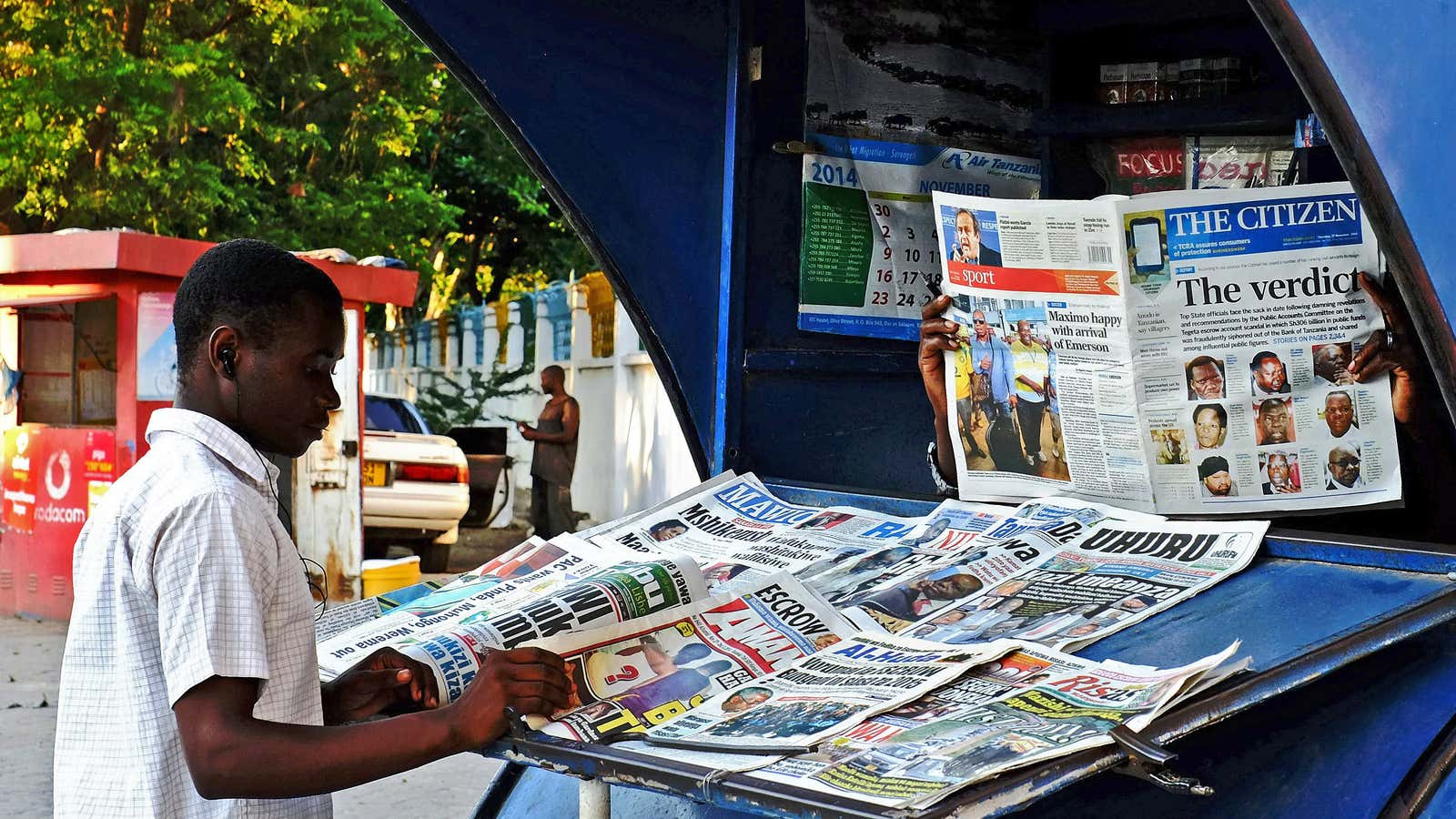Recently-elected Tanzanian president John Magufuli has garnered regional praise for his reformist proposals aimed at rooting out government corruption and incompetence. But his administration is facing its first real test of that agenda following a decision to ban a tabloid for producing journalism it says could threaten the country’s stability.
On Monday (Jan. 18), Nape Nnauye, Tanzania’s new information minister, told reporters that the government will invoke the 1976 Newspaper Act to de-register the weekly tabloid Mawio and restrict the publication from operating entirely, even through online platforms.
“The government regrets taking this decision but it was compelled to act due to the newspaper’s continuous writing and publication of content that is inciteful and threatening to the peace, stability and security of our country,” Nnauye said (in Kiswahili).
In the past, the act has been used to unilaterally ban publications that authorities claim are undermining the law of the land. Just this week, the government allowed the return of the East African, a regional publication that was stopped from circulating in early 2015 for allegedly not “being properly registered,” even though the paper has been operating in the country for more than two decades.
Nnauye claimed that Mawio has demonstrated a culture of publishing incendiary content and, despite repeated warnings, has refused to tone down its “inflammatory” coverage. He cited two recent articles related to the tense situation in Zanzibar, which is in political limbo following the annulment of its presidential elections last October.
One story, Nnauye said, suggested that the semi-autonomous Tanzanian archipelago was on the brink of violence, while another declared the opposition candidate the winner of the presidential campaign. Both stories, he claimed, put the security of the country at risk.
Mawio’s publisher and managing editor Simon Mkina disagreed with this characterization and said that the move to ban his newspaper is a sign of how much the government dislikes criticism. ”Today’s is a world of free speech, and the purpose of any newspaper is to move the development circle forward,” he told local media. “But sadly our government doesn’t want to be criticized, they only want a ‘yes, yes’ media.”
“It’s very sad for the new government that promised to protect the free press that within 100 days [of being elected] you ban a newspaper,” Erick Kabendera, an award-winning journalist who writes for regional and international publications, tells Quartz.
If the government truly wants to improve the quality of local journalism, Kabendera says, it needs to rethink its approach. “Banning a newspaper will not solve the problem of bad journalism. What will solve the problem is a conversation between media owners, government and the press coming together and agreeing on a framework that bad journalism will not be tolerated,” he says. “That framework is new media legislation accepted by all sides.”
Current press laws are outdated
Activists have long argued that Tanzania’s current media laws give too much power to the government, and need to be updated to provide for a neutral body to adjudicate disputes.
Invoking the Newspaper Act in the banning of Mawio, critics say, sets back efforts at media law reform, and calls into doubt Magufuli’s stated commitment to protecting press freedom in the country.
“For a more than a decade, we’ve been fighting for a better law, a more progressive law, a more media-friendly law,”Kajubi Mukajanga of the Media Council of Tanzania (MCT), an advocacy group, tells Quartz.
Those efforts have yet to bear fruit. Last year, the government tried to introduce legislation which had the declared aim of updating the country’s media laws. However, MCT and others in the media space lobbied against the legislation, arguing that the bills would further undermine press freedom.
Tanzania dropped six spots in last year’s Reporters Without Borders press freedom index. Nevertheless, east Africa’s second largest economy was still ranked as the best country in the region in terms of press freedom.
Last year’s passage of the Statistics Bill and the Cyber Crimes Act also alarmed free speech advocates, who argue the legislation restricts open dialogue and could limit the media’s ability to do their job effectively. The banning of Mawio will not help the government combat those criticisms.
Mukajanga still believes there is still room to lobby the new administration for a better working environment for the press.
“We need new laws,” he says. “We’ve engaged with the minister to draft more progressive laws.”
